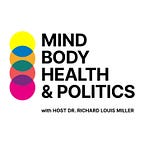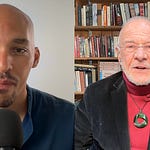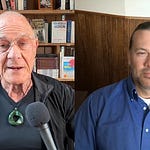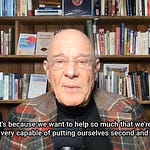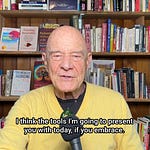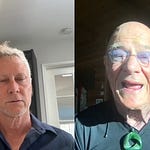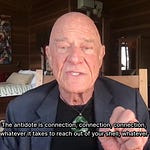Dear Listener,
What does it mean to die before you die?
My returning guest Jahan Khamsehzadeh, a seasoned guide with over 500 psychedelic sessions facilitated, knows this dance well – how an induced experience of “ego death” can have profound healing effects, but can also be destabilizing under certain circumstances. Jahan explores this process of psychedelic transformation in depth in his his excellent book The Psilocybin Connection, which connects to our recent discussion on the adverse effects of psilocybin and other psychedelic medicines.
In our latest conversation, we traded stories of harrowing psychedelic experiences. The first time I took a psychedelic (300 Morning Glory seeds – in the 1960s), I became convinced that the police were breaking down my door. It turned out to be jackhammers. Jahan once took LSD and ketamine together, and imagined that he was dying from contaminated drugs. Although we were both fine in the end – and in some ways emerged stronger on the other side – there are documented cases in which unexpected psychedelic side effects result in dangerous physical consequences.
Jahan shared a sobering story of one of his legal psilocybin retreats in Jamaica, where a participant became possessed by a certain grandiosity – convinced that he could swim over 2 miles across the ocean to an outlying island. As Jahan tells it, “I had to physically wrestle this fellow down for two hours - he was deliriously trying to jump in the water to swim out to sea. Without my intervention, he likely would have drowned.”

We must acknowledge that psychedelics can distort reality and fuel delusions in some individuals. Thankfully, Jahan’s guidance grounded this man before a watery fate could consume him.
Of course, careful screening and experienced guides are key. Although Jahan hopes that the right supports might some day open psychedelic access for all, he currently excludes those prone to instability from his retreats.
I was honored to connect with Jahan for a second time in this interview. He brings academic rigor alongside practical wisdom, having completed his Ph.D. on psychedelics and trained extensively as a guide.
In the end, Jahan left us with a beautiful reminder - at our core, we are beings of light and love. Psychedelics can strip away limiting stories, revealing our luminous essence. When anchored in this truth, fear loses its grip.
I hope you enjoy the program.
Golden light,
Dr. Richard Louis Miller
Links and Resources
Show Notes
Why transparency about psychedelic risks is vital to protect participants and advance the field ethically**
Risks include resurfacing trauma, impaired judgment, anxiety, and addiction
Low doses facilitate discussion while high doses explore inner worlds
Vetting screens out those prone to adverse effects like schizophrenics
How certain leaders justify unethical actions through "spiritual bypassing" and "guru syndrome" mentalities
Some use spiritual justifications for bypassing their shadows
Warning signs include megalomania, boundary violations, and defensiveness
Why backlash often meets those who raise concerns about adverse effects or problems in the community
Speaking up can threaten leaders and the movement's image
Messengers often attacked though message vital for integrity
How to navigate the tricky line between moral relativism and speaking up about clear harms
Context matters yet some patterns cause damage despite intent
Community norms shape values yet independent ethics still essential
Why anger is an essential emotion for calling out issues, not "bad energy" to transcend
Anger fuels change by awakening people to injustice
Leaders often condemn anger to maintain control
Seeking Psychedelic Testimonials: The Good, the Bad, and the Ugly.
We are currently looking for first-hand accounts of adverse effects of psychedelics—from ‘bad trips,’ to unwanted physiological complications, to abusive practices by guides, therapists, and shamans.
The interviews from this series will go into a forthcoming book on the topic—perhaps the first book its kind.
Please contact me if you would like to be interviewed. You can also leave us a voice message to share your story. We will keep your information anonymous unless you tell us otherwise.
NOTE: The podcast is always freely available thanks to our paid subscribers. Please share this post to show your support for transparency. The following transcript distills the key points from this show into a condensed form. It is meant as a reference - listen to the full episode for an accurate rendition of the conversation.
Transcript
Dr. Richard Miller 1:54
Welcome to Mind Body Health. I'm your host, Dr. Richard Louis Miller. Today, I am joined by my colleague and new dear friend, Jahan Khamsehzadeh, as we delve into the world of psychedelics. For those who are new to psychedelics, let's start with a basic question. Jahan, what can people expect from a psychedelic experience? Please share some insights on what they can look forward to and what they might encounter during their journey.
Jahan Khamsehzadeh 2:52
Yeah, I think they can expect the unexpected. And that's quite a wide range of things. And for most people, the unexpected brings up anxiety. For most people, the unknown, even the future and things that they can't control, triggers a fear response. So at the beginning, that's what we're working with. I think 90% of people who come into a psychedelic session experience some level of anxiety.
I then usually guide people through a 25-minute meditation after taking the medicine, and it tends to dissipate. However, there is a common trait that Terence McKenna, the great psychedelic philosopher, identified in all psychedelics - they dissolve boundaries. They dissolve the boundaries between different parts of ourselves, between us and other people, between us and the environment, and between us and the Divine. This can be really confusing.
If we look at the larger scale, such as divinity or Carl Jung's concept of the collective unconscious, we can see that the universe is made up of a vast imagination that is essentially infinite, just like our own psyche. Therefore, pretty much anything can happen during a psychedelic experience. The range of experiences could include meeting archetypal deities, feeling a sense of oneness with the universe, repressed trauma coming up, anger, rage, a sense of wholeness, aliveness, sexual energy, and disorientation.
Even when working with a specific psychedelic like psilocybin mushrooms, the experience can be different every time, which means there is always room for personal growth. However, it would be nearly impossible to predict in advance what will happen. So, it is important to come into the experience ready to embrace whatever may arise.
Dr. Richard Miller 4:30
Now, when they come in and experience anticipatory anxiety, how long does it typically take for them to settle down after the medicine begins to take effect and they start experiencing these feelings?
Jahan Khamsehzadeh 4:51
Now, that's one reason why I find it great to go right into a 25-minute meditation. It helps people connect with their body and their breath, and about 100% of the time, I have seen comments entered after this 25-minute meditation. So, that's something I found to help buffer that anxiety. I also like the metaphor of the onset of psychedelics to an airplane taking off. Generally, when an airplane takes off, there's some turbulence on the way up. It's normal and happens almost every time. And that's what happens with the onset of most psychedelics. There can be butterflies in the stomach, as the system is reorganizing and trying to make sense of the differences. There are potholes and flashes of different sights. So, it can be a little confusing. Generally, for about 15 to 20 minutes, it can be very uncomfortable, again, just like an airplane going up. But most of the time, once you reach altitude, you can coast the rest of the way.
Dr. Richard Miller 5:48
Now, do most people come to you with a specific agenda, such as dealing with anxiety, depression, or some other emotional issue? Or do most of them come because they want to explore and expand? Or do you encounter a wide variety of reasons? And if there are any differences, what are they in terms of experience between these two subject groups? Sure.
Jahan Khamsehzadeh 6:19
But 90% of people come because they're experiencing some level of pain or challenge. 70% or more experience depression, which is the largest epidemic in terms of disability worldwide. So the World Health Organization, if I include anxiety along with depression (which often coexist), that accounts for about 90% of my clients.


